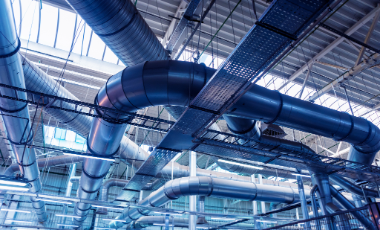Choosing the Right HVAC System for Your Home or Office
Understanding Your Heating and Cooling Needs
When it comes to choosing the right HVAC system for your home or office, it is crucial to understand your heating and cooling needs. This involves considering factors such as the size of the space, the climate in which you live, and the specific requirements of the occupants. By understanding these needs, you can ensure that you select an HVAC system that will provide optimal comfort and efficiency.
One important consideration is the size of the space that needs to be heated or cooled. A system that is too small will struggle to adequately heat or cool the space, leading to discomfort and inefficiency. On the other hand, a system that is too large will cycle on and off frequently, wasting energy and potentially causing temperature fluctuations. It is essential to accurately measure the square footage of the area and consult with an HVAC professional to determine the appropriate size of the system.
The climate in which you live also plays a significant role in determining your heating and cooling needs. For example, if you live in a region with hot summers and mild winters, you may prioritize cooling capabilities over heating. Conversely, if you reside in an area with harsh winters, a system with a strong heating capacity will be essential. Understanding the climate will help you choose an HVAC system that can effectively handle the demands of your specific environment.
Lastly, it is crucial to consider the specific requirements of the occupants. For instance, if there are individuals with allergies or respiratory conditions, you may want to prioritize an HVAC system with advanced air filtration capabilities. Additionally, if there are specific temperature preferences among the occupants, such as a home office that needs to be kept cooler than the rest of the house, a zoning system that allows for individual temperature control in different areas can be beneficial. By understanding the unique needs of the occupants, you can select an HVAC system that will cater to their comfort and well-being.
Evaluating Energy Efficiency and Cost
Energy efficiency and cost are two critical factors to consider when choosing an HVAC system. Not only can an energy-efficient system help reduce your carbon footprint, but it can also lead to significant cost savings over time. Evaluating the energy efficiency and cost of different systems will allow you to make an informed decision that aligns with your budget and sustainability goals.
One way to evaluate the energy efficiency of an HVAC system is by looking at its Seasonal Energy Efficiency Ratio (SEER) rating. The SEER rating measures the cooling output of an air conditioner or heat pump over a typical cooling season, divided by the energy it consumes in watt-hours. The higher the SEER rating, the more energy-efficient the system is. In the United States, the minimum SEER rating for new systems is 14, but more efficient options with ratings of 18 or higher are available. Investing in a higher SEER-rated system may have a higher upfront cost but can result in long-term energy savings.
Another aspect to consider is the Annual Fuel Utilization Efficiency (AFUE) rating for heating systems. The AFUE rating measures the efficiency of a furnace or boiler by calculating the percentage of fuel that is converted into usable heat. A higher AFUE rating indicates a more efficient system. In colder climates, where heating demands are higher, choosing a system with a higher AFUE rating can lead to significant energy savings.
While energy efficiency is important, it is also crucial to consider the initial cost and long-term savings of different HVAC systems. For example, a system with a higher SEER or AFUE rating may have a higher upfront cost but can result in lower energy bills over time. Additionally, some utility companies offer rebates or incentives for installing energy-efficient systems, further reducing the overall cost. By evaluating both energy efficiency and cost, you can choose an HVAC system that strikes the right balance for your budget and environmental goals.
Sizing and Capacity Considerations
Proper sizing and capacity considerations are vital when selecting an HVAC system. A system that is too small will struggle to meet the heating or cooling demands of the space, while an oversized system will waste energy and lead to discomfort. It is essential to work with an HVAC professional to accurately determine the appropriate size and capacity for your specific needs.
To determine the correct size, an HVAC professional will perform a load calculation. This calculation takes into account factors such as the square footage of the space, insulation levels, number of windows, and the climate in which you live. By considering these variables, the professional can determine the heating and cooling requirements and recommend a system that matches those needs.
Additionally, it is crucial to consider the capacity of the HVAC system. The capacity refers to the amount of heating or cooling output that the system can provide. Choosing a system with the right capacity ensures that it can effectively maintain the desired temperature in the space without excessive cycling or energy waste. An HVAC professional will consider factors such as the number of occupants, the amount of heat-generating equipment, and the insulation levels to determine the appropriate capacity for your needs.
By accurately sizing and considering the capacity of the HVAC system, you can ensure optimal comfort, energy efficiency, and cost-effectiveness. Working with a professional will help you avoid the common pitfalls of choosing a system that is either too small or too large for your space.
Exploring Different HVAC System Types
When it comes to HVAC systems, there are various types to choose from, each with its own advantages and considerations. Understanding the different types will allow you to select the one that best suits your needs and preferences.
One common type of HVAC system is a split system, which consists of an outdoor unit and an indoor unit. The outdoor unit contains the compressor and condenser, while the indoor unit houses the evaporator coil and air handler. Split systems are versatile and can provide both heating and cooling. They are often used in residential settings and can be further enhanced with features such as zoning for individual temperature control in different areas of the home.
Another type of HVAC system is a packaged system, which combines all the components into a single unit. Packaged systems are typically installed on the roof or on a concrete slab near the foundation of the building. They are commonly used in commercial settings and can be an efficient option for spaces with limited indoor space for equipment.
Ductless mini-split systems are another popular choice, especially for homes or offices without existing ductwork. These systems consist of an outdoor unit connected to one or more indoor units via refrigerant lines. Ductless mini-split systems offer flexibility in terms of zoning and can be an energy-efficient option since they eliminate the energy losses associated with ductwork.
Geothermal heat pumps are a more advanced and environmentally friendly option. These systems utilize the stable temperature of the ground to provide heating and cooling. Geothermal heat pumps can be more expensive to install initially but offer long-term energy savings and have a minimal environmental impact.
Ultimately, the choice of HVAC system type will depend on factors such as the specific needs of the space, budget, and personal preferences. Consulting with an HVAC professional can help you navigate the options and select the system that best meets your requirements.
In conclusion, choosing the right HVAC system for your home or office requires a comprehensive understanding of your heating and cooling needs, evaluating energy efficiency and cost, considering sizing and capacity, and exploring different system types. By carefully considering these factors and working with an HVAC professional, you can ensure optimal comfort, energy efficiency, and cost-effectiveness for your space. Remember, investing in the right HVAC system is an investment in the long-term comfort and well-being of your home or office.


